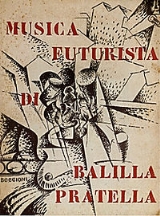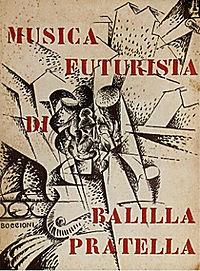
Francesco Balilla Pratella
Encyclopedia

Franceso Balilla Pratella (February 1, 1880 – May 17, 1955) was an Italian composer and musicologist
Musicology
Musicology is the scholarly study of music. The word is used in narrow, broad and intermediate senses. In the narrow sense, musicology is confined to the music history of Western culture...
.
Life and work
Pratella studied at the Pesaro Conservatory where he was a pupil of Pietro MascagniPietro Mascagni
Pietro Antonio Stefano Mascagni was an Italian composer most noted for his operas. His 1890 masterpiece Cavalleria rusticana caused one of the greatest sensations in opera history and single-handedly ushered in the Verismo movement in Italian dramatic music...
.
He joined the Futurist movement in 1910 and composed a number of modernist works for voice as well as for orchestra and chamber ensemble. He is the author of the Manifesto of Futurist Musicians
Manifesto of Futurist Musicians
The Manifesto of Futurist Musicians is a manifesto written by Francesco Balilla Pratella on October 11, 1910. It was one of the earliest signs of Futurism's influence in fields outside of the visual arts....
(1910), the Technical Manifesto of Futurist Music (1911) and The Destruction of Quadrature (Distruzione della quadratura), (1912). In The Manifesto of Futurist Musicians, Pratella appealed to the young, as had Marinetti, because only they could understand what he had to say. He boasted of the prize that he had won for his musical Futurist work, La Sina d’Vargöun, and the success of its first performance at the Teatro Communale at Bologna
Bologna
Bologna is the capital city of Emilia-Romagna, in the Po Valley of Northern Italy. The city lies between the Po River and the Apennine Mountains, more specifically, between the Reno River and the Savena River. Bologna is a lively and cosmopolitan Italian college city, with spectacular history,...
in December 1909, which placed him in a position to judge the musical scene. According to Pratella, Italian music was inferior to music abroad. He praised the "sublime genius" of Wagner and saw some value in the work of Richard Strauss
Richard Strauss
Richard Georg Strauss was a leading German composer of the late Romantic and early modern eras. He is known for his operas, which include Der Rosenkavalier and Salome; his Lieder, especially his Four Last Songs; and his tone poems and orchestral works, such as Death and Transfiguration, Till...
, Debussy, Elgar, Mussorgsky
Mussorgsky
Mussorgsky can refer to:*The Mussorgsky family of Russian nobility;*Modest Mussorgsky, a Russian composer belonging to that family.*Mussorgsky , a 1950 Soviet film about the composer...
, Glazunov
Alexander Glazunov
Alexander Konstantinovich Glazunov was a Russian composer of the late Russian Romantic period, music teacher and conductor...
and Sibelius. By contrast, the Italian symphony
Symphony
A symphony is an extended musical composition in Western classical music, scored almost always for orchestra. A symphony usually contains at least one movement or episode composed according to the sonata principle...
was dominated by opera
Opera
Opera is an art form in which singers and musicians perform a dramatic work combining text and musical score, usually in a theatrical setting. Opera incorporates many of the elements of spoken theatre, such as acting, scenery, and costumes and sometimes includes dance...
in an "absurd and anti-musical form". The conservatories encouraged backwardness and mediocrity. The publishers perpetuated mediocrity and the domination of music by the "rickety and vulgar" operas of Puccini and Umberto Giordano
Umberto Giordano
Umberto Menotti Maria Giordano was an Italian composer, mainly of operas.He was born in Foggia in Puglia, southern Italy, and studied under Paolo Serrao at the Conservatoire of Naples...
. The only Italian Pratella could praise was his teacher Mascagni, because he had rebelled against the publishers and attempted innovation in opera, but even Mascagni was too traditional for Pratella's tastes.
In the face of this mediocrity and conservatism, Pratella unfurled "the red flag of Futurism, calling to its flaming symbol such young composers as have hearts to love and fight, minds to conceive, and brows free of cowardice".
His musical programme was:
- for the young to keep away from conservatories and to study independently;
- the founding of a musical review, to be independent of academics and critics;
- abstention from any competition that was not completely open;
- liberation from the past and from "well-made" music;
- for the domination of singers to end, so that they became like any other member of the orchestra;
- for opera composers to write their own librettoLibrettoA libretto is the text used in an extended musical work such as an opera, operetta, masque, oratorio, cantata, or musical. The term "libretto" is also sometimes used to refer to the text of major liturgical works, such as mass, requiem, and sacred cantata, or even the story line of a...
s, which were to be in free verseFree verseFree verse is a form of poetry that refrains from consistent meter patterns, rhyme, or any other musical pattern.Poets have explained that free verse, despite its freedom, is not free. Free Verse displays some elements of form...
; - to end all period settings, ballads, "nauseating NeapolitanNaplesNaples is a city in Southern Italy, situated on the country's west coast by the Gulf of Naples. Lying between two notable volcanic regions, Mount Vesuvius and the Phlegraean Fields, it is the capital of the region of Campania and of the province of Naples...
songs and sacred music"; and - to promote new work in preference to old.
He is known now for his dedication to collecting the folk music of his native region of Italy, Romagna
Romagna
Romagna is an Italian historical region that approximately corresponds to the south-eastern portion of present-day Emilia-Romagna. Traditionally, it is limited by the Apennines to the south-west, the Adriatic to the east, and the rivers Reno and Sillaro to the north and west...
.
External links
- "Manifesto of Futurist Musicians" by Franceso Balilla Pratella in English translation from the original Italian, first published in Musica futurista di Balilla Pratella, 1912.

